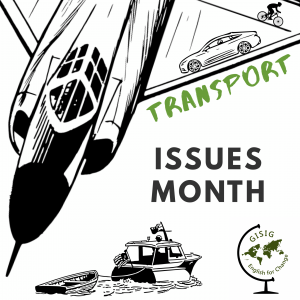The month of October focused on Transport. Many interesting topics were shared and these topics will be displayed below:

The GISIG Website
Week 1: (1/10 -5/10)
GISIG member, Bill Templar shared many interesting resources this week. He started off the discussion by introducing “World Bicycle Day.”
https://eltsustainable.com/category/dates-and-occasions/june-3rd-world-bicycle-day/
Another Interesting lesson plan on the same topic of bicycles was also shared by Bill. This lesson plan was in recognition of those who walk or cycle to work in winter.
https://eltsustainable.com/category/dates-and-occasions/winter-cycling-day/
This excellent lesson plan on rail travel was submitted by GISIG member, Bill Templar
https://eltsustainable.com/2012/03/15/4/
In addition to the lesson plan, the website below promotes travel by rail and it is very useful.
Week 2: (6/10 -12/10)
In week 2, Bill Templar shared many resources on public transport
https://en.wikipedia.org/wiki/Free_public_transport
https://socialistproject.ca/2019/08/public-transport-can-be-free/
https://socialistproject.ca/2018/11/steps-forward-in-free-access-to-public-transport/
https://socialistproject.ca/leftstreamed-video/ls393/
Gergő Fekete shared an interesting article on travelling in Luxemburg that states that Luxembourg is set to become the world’s first country to make all its public transportation free.
The link below also sheds light on travelling in another country which is Bulgaria ,and it focuses on reduction for certain passengers.
https://www.sofiatraffic.bg/en/transport/tarifa-i-prevozni-dokumenti/702/tariff
Bill Templar shared an IATEFL presentation by Aleksandra Zaparucha on” food miles” https://tinyurl.com/foodmiles99
Week 3: (13/10 -19/10)
This week was a continuation of the previous week and it focused on sources on food miles. Please find the resources below
https://youtu.be/k7DQ0EEqxV4 Food for food miles discussion
https://en.wikipedia.org/wiki/Food_miles
A TEDx talk: critical of some aspects of ‘food miles’ https://youtu.be/sfBzwBxl-zQ
George Fekete presented an excellent TED Talk on underground maps
https://www.ted.com/talks/michael_bierut_the_genius_of_the_london_tube_map/discussion#t-183493
Bill Templar commented on this post and shared his own personal experiences with subway transport and these excellent videos were attached.
Gergő Fekete shared another great lesson plan that focused on the impact of transportation on air quality.
https://eslflow.com/environmentlessonplans.html and Bill Templar supported this by providing another lesson plan on the environment and other resources from the Zinn Education Project in the US
https://www.zinnedproject.org/campaigns/teach-climate-justice
Bill Templar shared useful lesson plans on the environment by Owain Llewellyn.
He also shared a very engaging video from Canada that focused on transportation and tourism.
Bill also shared an interview with Naomi Klein. He mentioned what needs to be changed in economy, society and culture.
On October 17th Bill Templar shared information about the London underground causing a striking clash between protesters and commuters below.
He shared a link on another important topic that stresses on the need for immediate change to reduce carbon emission into the environment.
https://countercurrents.org/2019/10/extinction-rebellion-sweeps-the-world
Week 4: (20/10-26/10)
We continued the topic of public transport this week and the discussion focused on the public transit system in Toronto.
https://socialistproject.ca/2019/10/free-public-transit-is-key-to-green-new-deal/
Here is another great contribution by Bill templar. https://nccr.iitm.ac.in/Green%20Illusions.pdf
It is a link to a book titled, The Dirty Secrets of Clean Energy and the Future of Environmentalism.
Week 5: (27/10-31/10)
Gergő Fekete shared a link on different types of transportation and global warming.
https://e-csr.net/plane-cars-means-transportation-pollution-27537/
Bill Templar shared Hind’s lesson plan on sustainable transportation.
Bill Templar wrapped up the month with very interesting articles. The first one was on military transport and its carbon impact.
https://mronline.org/2019/10/29/flying-above-the-clouds-the-u-s-military-and-climate-change
and another one on the politics of wildfire and their fallout.
Still on the topic of wildfires, Bill shared an inclusive article by a major climate scientist for students.
The final document this month was submitted by Bill Templar and he left us with a very important point to think about;
“Planes or cars-Which means of transport pollutes the most?
https://www.facebook.com/GlobalIssuesSIG/
On Facebook images were posted to kick off the food transportation discussion. Participants were encouraged to get their students to draw their meals or take photos of them and calculate how far the food travelled to get to their plates.
http://www.myfootprint.org/en/your_food_footprint/
Week 1: (1/10 -5/10)
Another interesting link that was shared was on “the best means of transport for school.
Another interesting link was shared by Кумчо Вълчо from the UNESCO on World Teacher’s Day:
https://en.unesco.org/commemorations/worldteachersday
A fun and interesting activity titled rate my plate was posted this week. In it, students were expected to share photos of their plates and calculate the food miles.
http://www.ecostreet.com/10-ways-to-reduce-food-miles/
A post on the school bike scheme was posted this week. It aimed to encourage students to continue using their bikes when moving to secondary school.
https://www.google.co.uk/…/school-bike-share-scheme-pupils-…
Week 2: (6/10 -12/10)
Many posts on transport, ‘food miles’ and related topics were shared on the FB site: https://www.facebook.com/GlobalIssuesSIG/
An interesting article on public transportation in Luxembourg was shared this week.
https://www.archdaily.com/…/luxembourg-becomes-first-countr…
Penny Hands talked about a great way to compare different means of transport. She used a visual that helped people make the comparison.
Another article was shared by the Special Interest Group. It looked at 30 unique types of transport around the world.
http://livinglocal.triip.me/30-unique-types-of-transport-a…/
Week 3: (13/10 -19/10)
Week 3 of the Transport theme was kicked off with a very interesting TED Talks video on “The Genuis of the London Map”
https://www.ted.com/…/michael_bierut_the_genius…/discussion…
A picture was posted by Sue Annan and it focused on different ways to help the planet and two of them were on transport.
We also received an excellent lesson plan on the impact of transportation on air quality.
https://www.eslflow.com/…/upl…/2017/10/airqualityLesson3.pdf
A brilliant interview from our GISIG website was shared on the Facebook GISIG page. In this interview, Naomi addresses many issues and has a systemic view of what must change in the economy and society and culture.
https://www.youtube.com/watch?v=JpFZmisvrQQ&feature=youtu.be
From The Global Citizen website, a very interesting link on how the Netherlands turned 316 bus stops into homes for bees and it was a bee-utiful way to help the planet!
Week 4: (20/10 -26/10)
The Final week started with an excellent topic on free public transport in Toronto.
https://socialistproject.ca/…/free-public-transit-is-key-…/…
Another great resource that discussed pollution caused by car and plane was posted and discussed.
https://socialistproject.ca/…/free-public-transit-is-key-…/…
Week 5: (27/10-31/10)
Committee member Hind Elyas shared a presentation on different types of transport around the world:
https://www.facebook.com/groups/gisigiatefl/permalink/2371241323128162/
To conclude this great discussion, a great lesson plan on bicycles in everyday life was posted.
https://eltsustainable.com/category/dates-and-occasions/june-3rd-world-bicycle-day/
 It was a very interesting, lively discussion this month and we would like to thank all those who have contributed.
It was a very interesting, lively discussion this month and we would like to thank all those who have contributed.
Thank you very much from the GISIG family!
Hind Elyas,
GISIG Issues Month Coordinator.

What a great collection of materials. Thank you for sharing some of my own creations too. I should have got more involved with this and will try to be more involved in next month’s topic!
In a follow-up to this Issues Month, a brief article on ‘The Right to Mobility’ and the need for radically improved public transport in the UK has been published in connection in part with the election campaign in Britain early Dec. 2019. Bus services have declined drastically in much of England and Wales over the past decade. As the article stresses:
“Relative to this country’s wealth and population density, public transport cannot afford to get worse. Three thousand bus routes have been lost since 2010 as local authority subsidies to services dropped by 45 per cent. The number of miles travelled by bus fell by nearly five per cent between 2017 and 2018 alone, while car and van traffic, which started falling after the 2008 crash, has risen steadily since 2010.” Read this piece, useful critique and suggestions for transport policy applicable to public transport situations in many countries:
https://socialistproject.ca/2019/12/the-right-to-mobility/#more
This an intriguing article just published 5 Dec. 2019: > From Uberization to Enhanced Public Mobility for All< https://socialistproject.ca/2019/12/from-uberization-to-enhanced-public-mobility/#more It explores new perspectives on public transport and more.
The discussion on free public transport continues in Toronto, a worthwhile article: https://socialistproject.ca/2019/12/the-case-for-free-public-transit-in-toronto/
In Luxembourg, all public transit will be cost-free to users from 1 March 2020: https://www.archdaily.com/908252/luxembourg-becomes-first-country-to-make-all-public-transit-free
I live in the crisis stricken part of Cameroon and education right is strongly affected. My organisation; Hope for Vulnerables and Orphans (HOVO), is doing an amazing job by providing education to Internally displaced children through Home Teaching program. We also supply sanitary kits to keep girls in schools. I am happy to join this platform and I am looking forward to connecting with passionate teachers who are making a difference in their schools and communities.